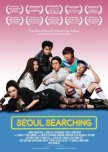Esta resenha pode conter spoilers
"Seoul Searching" Emulates John Hughes Just a Little too Well
[Written/Watched 21 Aug, 2020. Expanded 1/21/2021]
The idea of a film exploring Korean diaspora is certainly an interesting one, and the whole reason I decided to look into the film. For the most part there film has some fairly interesting moments regarding how divorced and alienated next generation Koreans are from S/N Korean culture and life.
But, outside maybe two characters, there's no real in-depth investigation into that alienation. It's summarized in scenes that directly address the subject, then quickly falls into the background of the 80s soundtrack and teen antics emulating John Hughes scripts (right down to his xenophobia and racism).
There's a moment where Korean-Japanese students are antagonized by our primary ensemble cast, and the two groups have to make amends with each other because their teachers don't want them perpetuating the antagonism of the past (that continues to directly impact both cultures). It got me thinking that the film desperately needed a Japanese-Korean protagonist to actually confront that with any kind of honesty beyond a energetic and flashy fight sequence.
The film's cast are effectively a bunch of broad stereotypes, introduced to the audience in a sort of faux roll call montage that exists just for the reaction shots of (South) Korean citizens cringing at the kinsmen who've lived abroad.
A lot of the characters are never given the opportunity to be humanized. The cast is bloated in a way better suited for a television series. A Black Korean teen, and a tomboy who mistrusts men as a result of an abusive father, got zero face time beyond a few moments that revolve around a Mexican-Korean character, Sergio. Sergio's whole character is that of the "Hot Latin Lover" stereotype who talks endlessly about women.
To be frank, the only characters with a story worth investing in is Klaus Kim (a German-Korean boy who wears expensive suits, characterized as a gentleman, one who ends up cheating on his girlfriend, lmao) and Kris Shutlz (a Korean-American girl who was adopted into a white family after her biological mother gave her up to spare her of an abusive household). They not only feel like human characters, but their individual stories, dynamic and chemistry keeps the film afloat.
The story of the teacher, who put his reputation before the mental health of his son (and family), wants you to empathize with the fact that he was responsible for pushing his son to suicide. I find myself hating the character despite the believably of the performance that communicates immense regret and shame.
A lot of the film is wasted on a Sid Vicious and Madonna stan, and a loud-mouthed military boy. The Madonna stan doesn't do much except reenact Madonna music videos and is used as a plot device in the Sid Vicious stan's angst subplot. The military boy embodies toxic masculinity, homophobia, and racism typical of the era, but is in no way critiqued as incorrect.
All three character subplots converge with an attempted rape scene that's glossed over and forgiven. The issue with these characters is entirely founded in the fact that they only seem to exist as an excuse for Benson Lee to exercise his anti-Blackness, sexism and homophobia.
It's a shame that the film isn't particularly interested in investigating its own anti-Blackness, because that's what really kept me from engaging with the film's narrative beyond Kris and Klaus.
Jamie (the Black Korean girl) is never given the opportunity to be a character, just a reactionary minor character for Sergio. When Sergio ends up paired up with the tomboy character, it seemed, at first, that he and Jamie would remain as friends. At the last minute, Jamie is transformed into shrieking Mean Girl who gets lemonade thrown into her face when she demands to know why the tomboy is moving in on her date, and disappears into the background. There's zero empathy for her.
There are three Korean-American characters who are clearly trying to emulate Run DMC (if not the Beastie Boys). Their entire reason for being in the film is simply to put on a Blackaccent and make a mockery of Black culture (Hip Hop culture specifically) as the writer-director takes every opportunity to flaunt his knowledge of racial slurs with them and the military boy. Once they're no longer needed for comic relief, they're booted out of the film off-screen.
Because the film was written by someone who didn't regard Black culture or its sole Black character with any kind of empathy, there's no one in the story to challenge the blatant racism on display in the film. The Run DMC wannabes are ultimately just as complicit in perpetuating racism as the military boy was, and the dismissal of Jamie.
The movie has its moments, but the problems outweighed the positives for me.
The idea of a film exploring Korean diaspora is certainly an interesting one, and the whole reason I decided to look into the film. For the most part there film has some fairly interesting moments regarding how divorced and alienated next generation Koreans are from S/N Korean culture and life.
But, outside maybe two characters, there's no real in-depth investigation into that alienation. It's summarized in scenes that directly address the subject, then quickly falls into the background of the 80s soundtrack and teen antics emulating John Hughes scripts (right down to his xenophobia and racism).
There's a moment where Korean-Japanese students are antagonized by our primary ensemble cast, and the two groups have to make amends with each other because their teachers don't want them perpetuating the antagonism of the past (that continues to directly impact both cultures). It got me thinking that the film desperately needed a Japanese-Korean protagonist to actually confront that with any kind of honesty beyond a energetic and flashy fight sequence.
The film's cast are effectively a bunch of broad stereotypes, introduced to the audience in a sort of faux roll call montage that exists just for the reaction shots of (South) Korean citizens cringing at the kinsmen who've lived abroad.
A lot of the characters are never given the opportunity to be humanized. The cast is bloated in a way better suited for a television series. A Black Korean teen, and a tomboy who mistrusts men as a result of an abusive father, got zero face time beyond a few moments that revolve around a Mexican-Korean character, Sergio. Sergio's whole character is that of the "Hot Latin Lover" stereotype who talks endlessly about women.
To be frank, the only characters with a story worth investing in is Klaus Kim (a German-Korean boy who wears expensive suits, characterized as a gentleman, one who ends up cheating on his girlfriend, lmao) and Kris Shutlz (a Korean-American girl who was adopted into a white family after her biological mother gave her up to spare her of an abusive household). They not only feel like human characters, but their individual stories, dynamic and chemistry keeps the film afloat.
The story of the teacher, who put his reputation before the mental health of his son (and family), wants you to empathize with the fact that he was responsible for pushing his son to suicide. I find myself hating the character despite the believably of the performance that communicates immense regret and shame.
A lot of the film is wasted on a Sid Vicious and Madonna stan, and a loud-mouthed military boy. The Madonna stan doesn't do much except reenact Madonna music videos and is used as a plot device in the Sid Vicious stan's angst subplot. The military boy embodies toxic masculinity, homophobia, and racism typical of the era, but is in no way critiqued as incorrect.
All three character subplots converge with an attempted rape scene that's glossed over and forgiven. The issue with these characters is entirely founded in the fact that they only seem to exist as an excuse for Benson Lee to exercise his anti-Blackness, sexism and homophobia.
It's a shame that the film isn't particularly interested in investigating its own anti-Blackness, because that's what really kept me from engaging with the film's narrative beyond Kris and Klaus.
Jamie (the Black Korean girl) is never given the opportunity to be a character, just a reactionary minor character for Sergio. When Sergio ends up paired up with the tomboy character, it seemed, at first, that he and Jamie would remain as friends. At the last minute, Jamie is transformed into shrieking Mean Girl who gets lemonade thrown into her face when she demands to know why the tomboy is moving in on her date, and disappears into the background. There's zero empathy for her.
There are three Korean-American characters who are clearly trying to emulate Run DMC (if not the Beastie Boys). Their entire reason for being in the film is simply to put on a Blackaccent and make a mockery of Black culture (Hip Hop culture specifically) as the writer-director takes every opportunity to flaunt his knowledge of racial slurs with them and the military boy. Once they're no longer needed for comic relief, they're booted out of the film off-screen.
Because the film was written by someone who didn't regard Black culture or its sole Black character with any kind of empathy, there's no one in the story to challenge the blatant racism on display in the film. The Run DMC wannabes are ultimately just as complicit in perpetuating racism as the military boy was, and the dismissal of Jamie.
The movie has its moments, but the problems outweighed the positives for me.
Esta resenha foi útil para você?











